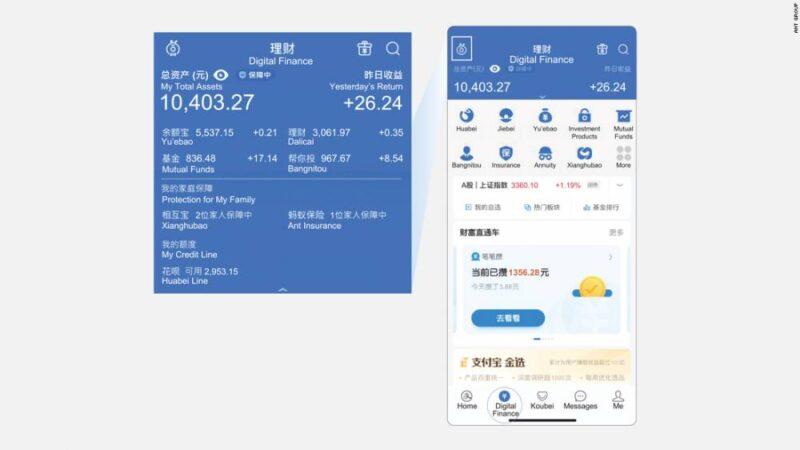When Jack Ma launched an obscure payment service to boost his online shopping empire 16 years ago, few expected it to succeed. Now that service forms the backbone of Ant Group, a financial behemoth that could be worth more than $200 billion.
Named after a bug because of its founder’s belief that “small is beautiful, small is powerful,” Ant Group is anything but tiny in China. It’s gearing up for a highly anticipated public offering in Hong Kong and Shanghai that could mark the second time Ma sets a record for the biggest IPO ever.”Ant Group really is the crown jewel of Jack Ma and … of China’s internet industry,” said Edith Yeung, general partner at Race Capital.It is one of the biggest technology firms in the world and the biggest online payments platform in China. The app has established its presence in every aspect of financial life in China, from investment accounts and micro savings products to insurance, credit scores and even dating profiles.But it all started out as a side project to plug a hole in China’s nascent online shopping industry. Back in 2004, very few people had debit or credit cards, and buyers and sellers using Alibaba’s (BABA) e-commerce platform needed a reliable way to handle payments.Read MoreMa tasked Alibaba’s finance team to create Alipay. The service would act as a trusted third party, holding money from buyers in escrow and only releasing it to sellers after the goods had been received and buyers confirmed they were happy with what they got.
“When I started [Alipay], everyone said: ‘Jack, this is the most stupid model we’ve ever seen, nobody will use it,'” Ma said in a 2014 interview with CBS News’ “60 Minutes.””I said I don’t care if this model is scientific, whether it’s fancy-looking, or not. As long as it works, it helps [to] build up the trust,” he said.
Money supermarket
And work it did. Today, Alipay has 711 million monthly active users, and it handled 118 trillion yuan ($17.2 trillion) in payments in the 12 months through June, Ant Group reported in regulatory filings. The Alipay mobile app, which debuted in 2009, accounted for more than 55% of China’s mobile payments market in the first three months of this year, while rival Tencent’s (TCEHY) WeChat Pay and QQ wallet accounted for about 40%, according to market research firm eMarketer.The app also connects millions of people to a ton of financial services. Alipay users can browse and select insurance products, pay bills, get loans, pay staff and invest in money markets.Yeung compares it to “a financial supermarket.” “Anything you want to do in financial markets” you can do through Alipay, she said. Alipay was spun off from Alibaba into a separate entity in 2011, and became part of Ant Group in 2014. Ma, who took Alibaba public in 2014 in a world record IPO, retains overall control of Ant, according to regulatory filings.Ant now offers so many financial services and products that it “has become part of the everyday life of hundreds of millions of individuals and businesses across China,” said Zennon Kapron, founder of financial technology consulting and research firm Kapronasia.
“It’s very difficult to overstate the impact the company has had on Chinese individuals,” he added.

Alipay users can use the app to order food, apply for credit, invest in money markets and more. One of the most popular services is Yu’e Bao, a wealth management product launched in 2013 that allows users to invest money left over in their digital wallets. The minimum amount to invest is just 1 yuan (15 cents).Within six months, Yu’e Bao — which means “leftover treasure” — had 49 million users and deposits of 250 billion yuan ($36.5 billion), according to state-run newspaper China Daily.At the time, most wealth management products offered by traditional banks required minimum investments of 50,000 yuan ($7,300), according to the newspaper. It lauded Yu’e Bao as “an instant hit, especially among young people whose driblet savings are largely ignored by banks.”At its peak in March 2018, Yu’e Bao’s assets under management topped 1.69 trillion yuan (about $267 billion at the time), according to Fitch Ratings. Chinese regulators have subsequently forced Yu’e Bao to shed assets over concerns about systemic risk — if the massive fund failed for some reason, it could wreak havoc on China’s economy. But it remains China’s largest money market fund with 1.26 trillion yuan ($184 billion) as of March this year, according to Fitch Ratings. The Alipay and Ant ecosystem has allowed many individuals and small merchants “to borrow money, accept payments online, to really provide economic empowerment for themselves, for their workers and their families,” said Kapron.
Huge trove of data
With hundreds of millions of people tapping into its financial products, Ant has access to incredibly valuable data on Chinese consumer behavior.Unlike the United States, China doesn’t have a reliable credit scoring system. In 2015, Ant launched Sesame Credit to fill the gap. The company describes Sesame Credit as a “trust score,” a way for businesses and consumers to assess people’s willingness and ability to pay for goods or book services. It is the country’s largest credit rating system, according to Yeung, of Race Capital.
But it is used for much more than just getting preferential loan rates. “I actually have seen the Sesame score used for online dating. You can actually choose for your credit score to be displayed in your dating profile,” said Yeung.Sesame scores are also shared on Chinese social media platforms by people who want to show off their purchasing power.

An example of the digital finance services available in the Alipay app. People with low scores can find themselves locked out of services and prevented from buying stuff. In 2015, Chinese courts starting sharing with Ant lists containing the names of people who had failed to pay off debts. A couple of years later, Chinese state news agency Xinhua commended Ant for using the data to punish 1.2 million debt defaulters by lowering their Sesame scores and restricting certain purchases using Alipay. The moves encouraged 126,000 of the defaulters to repay debts, according to Xinhua. Social shaming aside, Chinese internet users are growing increasingly uncomfortable with how much data is being hoovered up by big tech firms, and they are keeping an eye on what Ant is accessing.In 2018, the company apologized for misleading Alipay users in an effort to expand Sesame Credit’s user base.Ant had launched a new service which allowed users to look up how often they had used Alipay over the last year. But the landing page of the report had a box that was checked by default, which meant people were agreeing to use Sesame Credit’s services, according to Xinhua. Users were upset that they were automatically giving Sesame license to harvest their data and share the analysis with partner institutions. Ant apologized and changed the default option to an unchecked box.
Going all in on tech
Earlier this year, the firm changed its name from Ant Financial to Ant Group because it is “reinventing itself” as a provider of tech services to other financial companies, according Sunny Tian, a researcher with market research firm R3.In the past, Ant offered loans, investments, or insurance products directly to consumers and companies. In recent years, however, Ant has turned itself into a platform that charges banks and insurers fees to connect them with potential customers, Tian wrote in a report this month.
Ant’s lending platform, for example, offers a “three-one-zero” service — three minutes to apply, one second to get a credit decision, and zero people involved in the decision — but the loan is syndicated out to a mainstream bank. The debt sits on the bank’s books, with Ant taking a fee, according to Tian.”This moves Ant off the path of becoming a replacement to mainstream finance companies, enabling it to return to its roots as a less capital-intensive technology business,” she said.Ant has also launched Bangnitou, an AI-powered investment advisory service through a joint venture with Vanguard. Bangnitou, which translates to “help you invest,” applies algorithms that automatically reallocate investment portfolios. The minimum investment is 800 yuan ($118). In a little over three months after its April launch, Bangnitou had attracted approximately 200,000 new customers.
Source: edition.cnn.com

